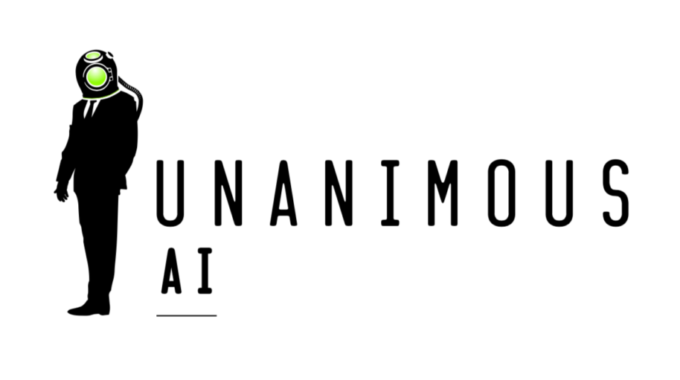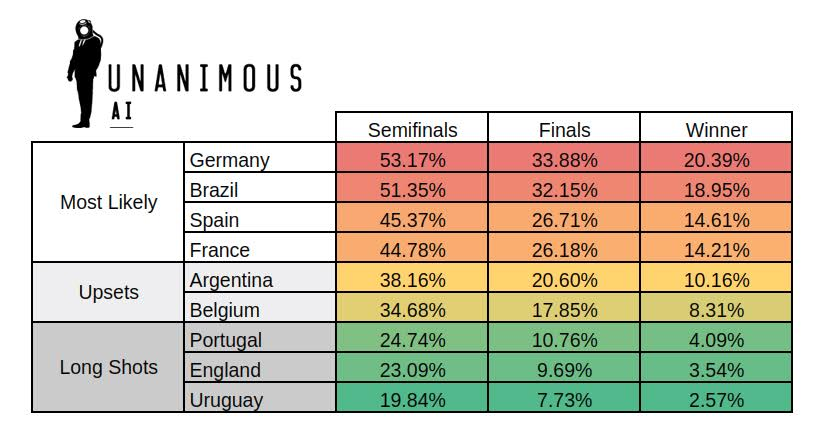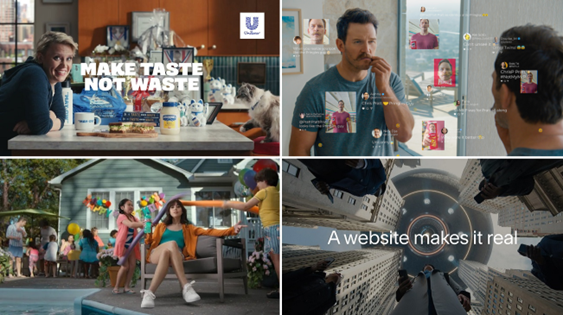
Inc. Magazine published an in-depth profile of Unanimous AI and the technology that powers the Swarm platform. While INC couldn’t resist publishing a set of AI-powered predictions for the World Cup, the heart of the article describes how Fortune 500 companies are using Swarm Insight to inform their businesses.
From INC. magazine:
Here’s What’s Next for the Startup that Predicted the Kentucky Derby
The World Cup 2018 has officially begun–which means, if you’re a hardcore soccer fan, you’re pretty tied up for the next month watching the matches. For those who can’t or don’t want to follow the action, here’s a major spoiler: Germany is going to beat Vegas-favorite Brazil in the final, and Spain and France will round out the tournament’s final four teams.

That prediction comes courtesy of Unanimous A.I., an artificial intelligence startup that performs a kind of complex crowdsourcing. Founded by scientist and engineer Louis Rosenberg, Unanimous can be used to better understand the nuanced opinions of a population, which makes it useful for tasks like performing market research, diagnosing diseases, or making predictions about the future.
Launched in 2014, the company’s technology already has an impressive résumé of accurate forecasts. It predicted the past three years’ worth of Oscar winners more accurately than any individual expert. It correctly prophesied the Time Person of the Year and called President Trump’s 100-day approval rating down to the percentage point. In 2016, it nailed the Kentucky Derby superfecta (the top four finishers, in order)–netting anyone who followed its advice a $542 payout on a $1 bet. (At least one person did, and earned $54,200.)
The company’s sports blog has proven startlingly accurate, forecasting the 2016 World Series outcome four months before it happened; last year, before the Patriots beat the Falcons in the Super Bowl, 34-28, Unanimous correctly predicted the score.
Forecasting sports and entertainment outcomes, though, isn’t exactly what Rosenberg had in mind. A Stanford-educated computer scientist who built what’s believed to be the world’s first augmented reality system while working for the U.S. Air Force in 1992, Rosenberg has spent much of his career working on enhancing human intelligence.
In the late 2000s, he started thinking seriously about how to make people smarter, not on an individual level but collectively.
“There’s a reason why birds flock, and fish school, and bees swarm,” Rosenberg says. “Organisms become significantly smarter as a group. Nature has spent millions of years trying to optimize how living things operate together, because they can solve very complicated problems together, and ultimately are able to survive by thinking as a system.”
For Rosenberg, the question became: If birds and fish and bees can do it, why can’t humans? In 2014, he founded the San Francisco-based startup and set out to create the technology that could help people do just that.
Unanimous’s “swarm” intelligence, as Rosenberg calls it, works by simultaneously presenting dozens of individuals with a series of questions. On a computer or tablet, their potential answers are laid out like a pie chart. A movable cursor begins in the center, and the participants all pull toward their desired answers in real time, engaging in what Rosenberg calls a “multi-directional tug of war.”
To describe how this might play out in a simple real-world decision, Rosenberg gives the example of five people choosing what kind of food to get for dinner. The system would study a variety of factors: Where do the participants pull, and how strongly? When do they switch from their first choice to their second? When do they stop reacting entirely? One user might consistently nudge the group toward Italian food; another might have no opinion unless she sees the cursor heading toward Mexican, in which case she pulls toward whatever the second most popular choice is at the time. On the basis of that behavior and what the A.I. calculates to be the group’s collective confidence and conviction, the system produces an answer to each question.
“People’s opinions are complex,” Rosenberg says. “People might have small differences of opinion between some options and strong differences between others. So the answer the A.I. settles on might not be anyone’s first choice, but it will be the one that maximizes the group’s satisfaction.”
When Constellation Brands, one of the world’s largest beverage companies, decided to break into the cannabis industry late last year, it had to prepare itself for the public reaction that might follow. The Victor, New York-based company’s portfolio already included brands like Corona, Ballast Point, and Svedka vodka. Now, by investing in Ontario-based Canopy Growth, it was entering uncharted territory.
“We wanted to get an understanding of what people would think beyond what a typical poll would offer,” says Julian Cohen, who heads the company’s emerging categories group. The firm enlisted artificial intelligence startup Unanimous A.I. to help it gauge customer reactions.
After compiling a group of everyday volunteers, Unanimous quizzed them on their thoughts about Constellation’s new investment. “If there had been a strong negative reaction, we would have been able to prepare messages in advance,” Cohen says. The results, however, showed that people were overwhelmingly supportive–and thought their peers would be too. The prediction has proven accurate: Customers responded positively to Constellation’s October announcement that it would be buying a stake in the company and exploring marijuana-infused beverages in Canada, and the company’s stock is up 5 percent in the months since.

Earlier this year, marketing firm VML enlisted Unanimous for a research project it was presenting to its parent company, WPP, the world’s largest marketing firm by revenue at $20 billion. VML had the goal of predicting what retail will look like in four years. It gathered 130 staffers from across North America and Asia, including creative directors, tech experts, e-commerce analysts, and everything in between. The swarm, which took about 30 minutes, led the company to a number of conclusions on the future of voice shopping, mobile payments, and customer fears, which VML then presented to WPP to incorporate into its decision-making moving forward.
“It was a really efficient way for us to get a consensus of a lot of smart people in different markets. I don’t think there’s another research tool that would have allowed us to do that,” says Jon Bird, VML’s executive director of global brands. “It allowed us to bring that qualitative research into much sharper focus.”
Rosenberg refers to that consensus as a “brain of brains.” The technology can be used across a wide range of fields: At Boeing, engineers have used it to aid in cockpit design; doctors at the Stanford School of Medicine have been researching using it to help diagnose and decide on the best course of treatment for sick patients. The startup, which uses a subscription model and charges on the basis of the volume and frequency of the customer’s use, has raised $6 million in funding. It’s been approached by unsurprising potential clients, like financial institutions that want help forecasting the behavior of particular markets, and more outside-the-box ones, such as law firms looking to predict how a jury will react to particular testimony.
Of course, Unanimous’s technology isn’t always right. This year, it predicted the University of Virginia would make it to the men’s basketball national championship, and the team lost in a historic upset in the tournament’s first round. Predicting those kinds of exceptional events remains a tall task for A.I. systems and the humans behind them. This helps explain why Unanimous’s predictions often do fall in line with the general consensus. Its top nine picks for the World Cup, for example, were the top nine favorites according to Vegas odds (though not in the same order). Still, the number of predictions that have proved spot-on is impressive, to say the least.
At a time when A.I. threatens to render many professions obsolete, Rosenberg sees his technology as performing a critical task: keeping humans relevant.
“We’re building super intelligent systems, but we’re keeping humans in the loop. We’re keeping human opinions, values, morals, and emotions as part of the equation,” Rosenberg says. “That’s an alternative to what 99 percent of the industry is doing. We’re not looking to replace people with algorithms. We’re looking to make people smarter so they can compete with the algorithms.”
Unanimous will be fielding swarms throughout 2018 to track the sentiment of the American public and to identify the trends and behaviors that are shaping our future. If you would like to stay informed of our research, sign up below.
Want to learn more about our Swarm AI technology? Check out our TED talk below…

